#challengers analysis
Explore tagged Tumblr posts
Text
Challengers x 7 sins
Lust

Envy

Pride

Wrath

Sloth (for Patrick not wanting a job and having a messy car )

Gluttony (for Patrick always taking Art's food )

Greed (for denying Patrick a place to sleep because of money ��)

49 notes
·
View notes
Text
the way patrick zweig is so clearly a creature of desire; so fundamentally hungry. always devouring, uncaring of how desperate he might appear for it—taking a bite of the line judge's bagel sandwich before he even sits down; scarfing down his hotdog before grabbing a bite of art's, and then later treating their churros exactly the same way; picking the cigarette that tashi slapped out of his mouth up off the literal alleyway street so he can finish smoking it. acting on his hungers without asking permission first.
the way art donaldson is comfortable expressing desire without acting on it; content to yearn. mr. i-do-what-she-says-and-then-i-win obediently drinks his green juices, his electrolyte mixes; he lays his heart on the table for tashi, twice, and lets her decide when to take it; he tells her he wants to kiss her, but then lets her come to him to actually do it. a lapdog, just like patrick says: he'll turn his pleading eyes to you, desire writ across every line of him, but he is too well-bred to ever snap and just take.
....except, of course, with patrick; but even then, only when he can sublimate his desire for patrick into the appearance of desire for another woman. snapping at the churro when patrick calls him out over sowing doubt in his relationship with tashi is the obvious one, but also the fact that art is the one to come first in their mutual-masturbation experience when talking about kat zimmerman (how much of it was because of miss zimmerman and how much of it was art letting himself imagine patrick with her?). patrick, in the churro scene, describes it as seeing art "lit up about something," and while he's not wrong i think it's more specific than that. art feels deeply, keenly, but he guards the flames of his desire so carefully; banks them down and keeps the embers glowing for years. tashi is content to meet art halfway, to take the quiet longing invitations he extends. patrick is not. his desire, his hunger, is bigger than that. he wants to see sparks fly. how perfect, then, that he is the only one who can bring that out of art. he does exactly that with the racket-neck signal, and art (once he's over his shock) is once again lit up; ready to take the win, not to have it handed to him.
the way tashi duncan understands them both, perfectly, from their very first night in that hotel room that was so formative for all three of them. she kisses art first, because she already knows that if she kissed patrick first, art would take that as a rejection and retreat; put his desire away. she kisses art first because she knows patrick will not give up on his own desires that easily. she understands how to stoke art's desires and how to temper patrick's and teach him patience. and because of that, she gets them both: she doesn't have to choose.
#challengers#challengers meta#patrick zweig#art donaldson#tashi duncan#fan analysis#challengers analysis#my post#text post#v speaks#character analysis
1K notes
·
View notes
Text
Wait…

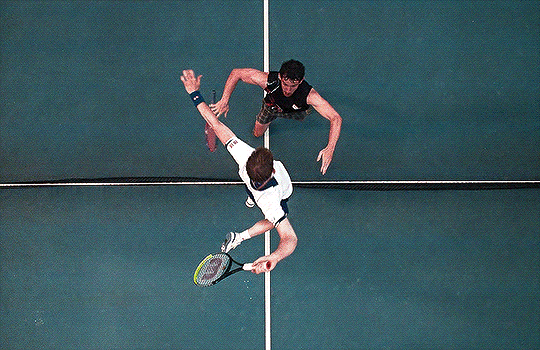
When i catch you Luca (pun now intended)😭 Im really learning new things everyday 😭
#yall spotted this day one im sure#sorry#it always takes me a while to catch on#challengers analysis#challengers#art donaldson#patrick zweig
67 notes
·
View notes
Text
youtube
OH HOW I MISSED THEM
god please bring my family back together
#my shaylas#i will never get tired of this movie#merry yaps ༺♡༻#challengers analysis#challengers bts#challengers#challengers 2024#mike faist#josh o'connor#zendaya#luca guadagnino#art donaldson#patrick zweig#tashi duncan#Youtube
24 notes
·
View notes
Text
Challenger Analysis, Patrick:
Serving dirty
-
-
The serve. Elegant. Powerful. And at every time and for reverting the same technique.

Patrick: lol no
As mentioned in the movie, he only plays like he wants, in his own style since teen. While every player has a unique sense of motion, as every human has, their serve looks similar.
It’s like walking. Nobody cares about your walking unless you’d have a very different kind.
That’s the thing with Patrick. Normally, you start low, tossing the ball far above the head and then raising the racket behind the head, unleashing a powerful move up to 200km/h.
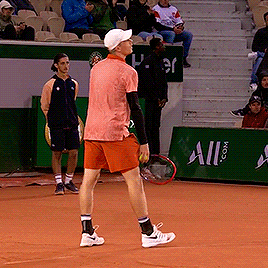
Not Patrick. It’s as if he slaps tennis history itself with his serve starting with his arm above the head, making it worse with the constant wiggle. And he enjoys every second. Patrick did tennis serve so dirty.
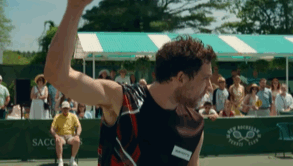
Just to make his statement:
He wants to provoke,
he wants to be special,
he doesn’t want to submit to the rules.
Just being cocky, even after Tashi told him he still plays like in his early days, still relaying on his natural talent instead of classical training and improving his technique.
So, what‘s his point?
playing tennis & being poor instead of working for his rich parents & being rich = his own serve instead of the classical, normed serve
not changing his serve to the common one= not changing (still not over Art/tashi), also being stubborn and cocky as he his with his dirty smirk
I hope you liked it!
🎾 Thanks for reading 🎾
#challengers#patrick zweig#josh o'connor#challengers analysis#tennis#challengers movie#serve#tennis serve#serving
54 notes
·
View notes
Text
•Art felt guilty for tashi’s injury, because he tried to manipulate Patashi relationship, so he is mean to Patrick, shouting at him, so he can feel that Patrick is the guilty one
•the whole sauna scene of him being mean to Patrick so he can feel better about himself even that he already are a successful tennis player, he don’t need to prove himself more he just wants to hurt Patrick
•Patrick cares about Art and he knows he is unhappy
•Patrick misses Tashi and Art and it’s not afraid to admit it, on Stanford, on Atlanta, on the sauna and on the car with Tashi while cuddling her he show his feelings and is vulnerable with them
•Patrick risk losing the game when he “motivates”Art to play better… because he cares about Art and Tashi a lot
maturing is realizing patrick was the sweetie loverboy and art was the asshole
41 notes
·
View notes
Text
I find the fact that the confrontation at the end of UTRH is often summarized as Jason asking Bruce to kill the Joker for him fascinating.
Because that's not what happened.
Jason holds a gun up to Joker's head, gives Bruce another, and tells him that if Bruce doesn't do something (shoot Jason), he will kill Joker.
Jason doesn't give the gun to Bruce so that he would shoot Joker. He isn't expecting Bruce to pull the trigger on the clown. He's asking Bruce to do nothing. To be inactive. Because that will still be a choice, and despite having done nothing, everybody clearly agrees that Bruce would still, at least in part, be responsible for Joker's death.
...And to me, this moment is a kind of- microcosm, of the rest of Jason's point. Because after being captured and carted off to Arkham, the villain will escape again, and will kill more people. The only way to truly prevent that from happening would be to kill them; Bruce refuses to do so, and I respect his right to choose such a thing for himself, but it is still a choice, and if we agree that Bruce's inaction during the confrontation would leave him at least partly responsible for the Joker's death, then we must also agree that his inaction in permanently preventing the Rogues from killing more people means he is also, partly, responsible for all of those deaths.
#my dc posting#batman#dc#bruce wayne#jason todd#joker#uhh is this like analysis or meta#anyway. to me this is the message that scene sends#if we say bruce doing nothing would mean he assisted in the murder of joker then bruce doing nothing about the villains means he is also#responsible for those deaths#ANYWAY yes b4 you come at me;;#bruce's belief in rehabilitation and that everyone can get better is central to his character#and i love it and no i dont actually think he should kill the rogues or whatever#but the question there is. Are you fine with the future victims your decisions will cause?#Are their lives worth the slim chance any of these people will get better?#batman says yes theyre worth it. red hood says no theyre not.#thats the fundamental moral difference there#its why jason challenges the batman status quo#which is why he cant be harnessed well after his initial return bc comics can never truly escape that status quo#anyway i sure am having some thoughts for someone not that smart so if you disagree please tell me!!! just be civil or ill just block you <#...anyway this is another thing BTAS succeeds in bc i always feel like yes these villains do deserve yet another chance#despite what theyve done. bruce's belief in them doesnt feel stupid and naive#its abt what you yourself can live with. bruce can live w the deaths of the ppl the criminals he doesnt get rid of kill#and jason can live with killing those criminals and preventing further victims
1K notes
·
View notes
Text
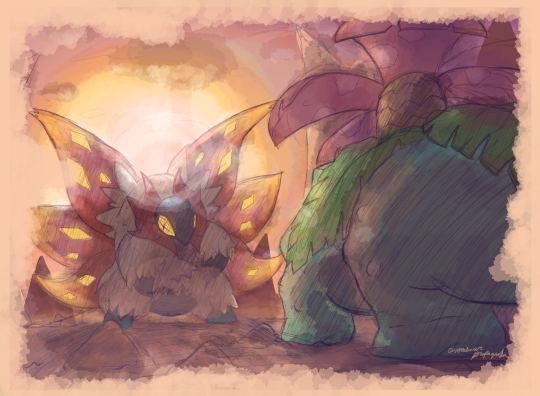
Drawing Venusaur with every Pokemon pt. Slither Wing
#***UPDATE*** Encounter with subject “Slither Wing” ended in a stalemate. Type analysis in progress...#*fig. 1* Partner Venusaur and Subject Slither Wing moments before battle#venusaur#slither wing#pokemon#paradox pokemon#pokemon scarlet and violet#fanart#artists on tumblr#digital painting#digital art#art challenge#🌺
1K notes
·
View notes
Text
I was thinking about this theory this morning 👀. I do think he has self destruction tendencies, and lack of responsibility. I mean the constant failure and the loneliness can lead us to bad places mentally. So he doing drugs makes sense to me
i just read some comments about theories in challenges and one of them is patrick being a drug user. they pointed out the bruises on his arm and the way he rubs his nose or some shit. i just wanna know what you guys think abt this bc idk i think it's plausible but i also don't want to think abt it like that T___T
53 notes
·
View notes
Text
“I hate that I fell in love with you.”
But she didn’t. She found him lying on the beach, and he was real, and he was there, and she wasn’t alone anymore, and she responded with such desperation and carelessness that she hurt him and drove him away.
She’d been alone so long that she mistook the relief of not being alone for love. She felt connection for a moment - and through her own actions, she messed it up.
(Even if she hadn’t, he still would have left her. She still would have ended up alone.)
“Why in the world won’t you love me too?”
Because you can’t control who does or doesn’t love you - but how would Calypso know that? She doesn’t know what love is. Chances are, no one will ever love her again.
#ok a character can do terrible things and still be a great character#calypso is a good character#the story challenges you with this character#it makes you think about what does and doesn’t make a character unsympathetic or irredeemable#and I love it#epic the musical#epic the musical spoilers#epic the vengeance saga#epic calypso#epic the musical analysis#epic odysseus#odysseus#calypso#im not sorry for loving you#madbard rambles#I’m not defending her#but I want to understand her
637 notes
·
View notes
Text
Tashi and Art changed their hair cut over the years, but Patrick still have the same hair cut, the only difference is his grey hair…
“You never grew up”, but you can’t help getting old…




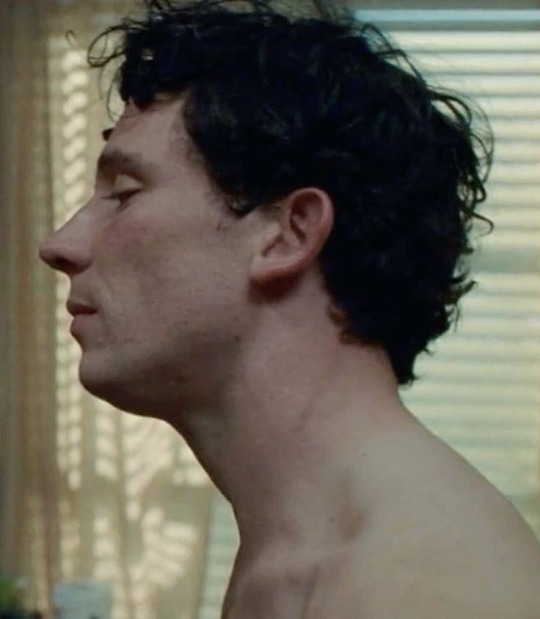

#challengers#patrick zweig#tashi duncan#art donaldson#challengers analysis#I don’t know if someone have already talked about this
400 notes
·
View notes
Text
something I think about a lot -- especially whenever the bit comes up about Bulma hooking up with Vegeta because he seemed lonely -- is how underrated and under-discussed Bulma's loneliness is too. She's not isolated in the same way Vegeta is, but throughout the series she presents herself as an extrovert, while struggling to make friends, displaying a deep frustration toward her relationship with her parents, and then the late-add lore that her big sister just up and left her whole life behind when Bulma was still a little girl, and kind of left Bulma to deal with their parents and their company and all the hard parts of growing up by herself.
The other thing is that Bulma's intellect is largely unmatched, especially in anyone her age. Even including her sister, she doesn't have anyone she can talk to about the things she's passionate about. She can't communicate all the stuff that goes on in her head, because nobody who cares would get it and nobody who gets it would care. Vegeta, due to being a highborn alien raised in a cutting-edge advanced society, is very likely the first person in her age bracket that knows and is actually interested enough in science to talk about it with her, and can follow probable logic well enough to not have his eyes glaze over when she explains something out of his depth. And, it's implied that it was not common in any of his demographics either -- Vegeta's intelligence was something Frieza had to remind even his highest-ranking men to remain on alert about.
All this to say, I think it gets read a lot that Bulma felt sorry for Vegeta and just wanted to fix him, but I don't think that's giving her enough credit as a person with her own life and experience. Rather, I think it's a really cool and interesting part of their dynamic that loneliness and isolation as a direct consequence of being Born Special(tm) is something Bulma can fully understand and empathize with.
#dbtag#media analysis#vegebul#I just chinhands I like them a lot your honor#especially because both of them are people who spent the first half of their story lashing out whenever their value was challenged#and once they got together that vein of insecurity slowly faded out from both of them#And I love the implications of that
603 notes
·
View notes
Text
this tiktok actually set my sister off too lol. but she came to it from the tennis pov… if we want to assume the question is who’s the better tennis player? is the films central thesis…the movie answers this, inherently its Patrick. Patrick has the raw natural talent and skill. He was dominant on the courts in high school and because of this when he got out there among the professionals he was likely taken aback by all the people who had what he had plus drive and discipline to get better.
Art has the discipline and focus. He didn’t assume he was the best and therefore put in the work to get to where he wanted to go. He was used to working hard (my sis is Arts #1 opp so she left this part out lol). Patrick was not, hence his statement about tennis being a way to avoid responsibilities (paraphrasing).
But whos better is not the question. for tennis lovers…how many times have we seen federer and serena taken down by relative no names. Does that make them any less talented? Does it mean they didn’t belong amongst the top seeded players? Tennis is as mental as it is physical and a game of tennis doesn’t always tell you who’s the better player. Hence Arts famous words, its about winning the points that matter.
Is he better than Patrick? no.
does it change his ranking as one of the top seeded players? also no.
And ultimately even here Tennis is only a metaphor. Art wins the points that matter. He won tashi. He won the career. He cut out his heart to do it (*cough* Patrick *cough*). But as so many of you said this is why tennis stops mattering in the end because winning the game would mean nothing if they didn’t reconcile and that would have been the real dissatisfactory ending.
#realizing that post was long as hell lol#challengers analysis#my sisters thoughts#rare to get her to still discuss challengers with me in 2025 lol#art donaldson#tashi duncan#patrick zweig#challengers#challengers 2024#sorry if in coherent#was trying to capture her ideas… this all came from an angry voice message lol
42 notes
·
View notes
Text
I'm gonna put my two thirds of a classics degree to work here
When I said Phaidei can be seen as an allegory for Odysseus and Penelope, I meant it
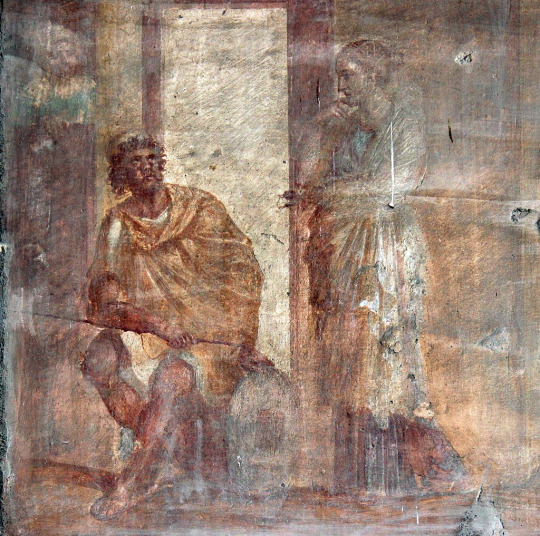
Penelope encounters the returned Odysseus posing as a beggar. From a mural in the Macellum of Pompeii
Spoiler warnings: 3.0, 3.1, 3.2, as well as leaks towards the end.
TL;DR: Mydei is Penelope, Phainon is Odysseus.
Mydei and Penelope
Now, I know it may seem tempting to say that Mydei, being the big, strong, burly man that he is, is a parallel to Odysseus, but he’s actually Penelope! This whole fever dream of a "theory" actually stems from the parallels between Mydei and Penelope, specifically. Phainon was a secondary thought lmao.
Point 1) The theme of buying time
It cannot be understated just how much of Mydei’s core themes center around buying time, not just for others, but also for himself.
On multiple occasions, he goes to some pretty extreme lengths to do so, namely in 3.0 when he offers up his own immortal body as a means of keeping Nikador occupied in Castrum Kremnos. In that moment, he completely puts his own safety on the back burner – the team needs to hold Nikador off long enough to render them immortal once more, and Mydei has the solution, no matter the personal cost of dying a couple of times. Later, in 3.1, he puts his own personal feelings aside to shoulder the divinity of Strife, despite the fact that he was hesitant to do so in 3.0, simply because it would be for the best. Then, at the end of 3.1, he completely disregards his own wants and fears, and takes the fight to the Black Tide on his own because he is the only one capable of doing so. By sacrificing himself in this manner, he can buy his fellow Chrysos Heirs enough time to usher in the new dawn, and the miracle of Genesis.
But Mydei doesn’t just buy time for others, he also does so for himself. Throughout 3.0 and 3.1, his story leads up to one massive decision: what to do about the Kremnoans. He is torn between claiming the crown – his birthright – and leading his people back to Castrum Kremnos, or leaving them in Okhema.
However, to the Kremnoans, Nikador is synonymous with kingship, judging by Krateros’ reaction to Mydei surrendering the Coreflame to Phainon. In Krateros’ eyes, Mydei giving up Nikador’s divine power is the same thing as him “giving up the throne of Kremnos and forsaking his people”.
As previously stated, Mydei is hesitant to claim Nikador’s coreflame for fear of ending up like his corrupt forebears and leading his people down the wrong path, so obviously he wants to put off that decision for as long as possible. First, he enters a (frankly, pointless) competition with Phainon just to decide who gets to deliver the final blow to Nikador, and gives up his win ridiculously easily if Phainon loses. That way, they can ignore the decision they have to make for a while longer. Then, when Nikador is dead, he is quick to surrender the Coreflame to Phainon, and promptly shuts down Phainon’s attempt to discuss the subject any further. So, by sending Phainon to the trial of divinity, Mydei can avoid making his own decision regarding the fate of the Kremnoans, if we take Krateros’ words about kingship and Nikador’s powers into consideration. Effectively, Mydei makes sure the decision is out of his hands – he didn’t technically reject the Coreflame, after all.
So how does all of this connect to Penelope, exactly?
Well, Penelope’s themes also center around buying time – for herself, and for Odysseus. She also has a big decision to make: who should succeed Odysseus as the king of Ithaca, and just like Mydei, she wants to put it off for as long as possible. Naturally, she doesn’t want to choose, and comes up with increasingly desperate ideas to keep the suitors at bay. In the end, she does succeed; she buys Odysseus enough time to return home, and as such she never has to choose a new suitor. Unlike Mydei.
You see, Mydei actually fails in avoiding his decision. In the end, he is forced to take on the Coreflame when Phainon fails the trial. As a result, Mydei has to make a decision regarding his people and his potential kingship. In this sense, Krateros and the rest of the Kremnoans are the suitors, encouraging Mydei (Penelope) to make a choice.
If we view Mydei’s actions through this Penelope-esque lens, we can draw some pretty convincing parallels!
Point 2) The challenge
At the climax of Penelope’s story, right before her reunion with Odysseus, she makes a last-ditch attempt to hold off the suitors by presenting them with a seemingly impossible challenge. She sets up twelve axes and demands that the suitors shoot through them flawlessly using Odysseus’ old bow. What she doesn’t tell the suitors is this: the bow is nigh impossible to string. Then, as a sort of fail safe, she sits down behind the axes. That way, if a suitor succeeds, she is immediately killed and doesn’t have to marry them.
While this is more far-fetched than point 1, a connection to Mydei’s actions can still be made, in the sense that he, too, has made arrangements for the worst case scenario. In case he is corrupted by the Black Tide, and thus cannot buy the Chrysos Heirs enough time to bring about the miracle (i.e buy Odysseus enough time to return to Ithaca), Mydei has arranged a fail safe for himself by telling Phainon about his weak spot. Phainon is the only one who knows about it, and as such, he is the only one who can shoot through the twelve axes with Odysseus’ bow. The parallels may not be perfect, but the narrative is very similar.
Point 3) Sparta/Castrum Kremnos
My last point is their origins. Penelope is Spartan royalty, though she was never its ruler. It’s no secret that Castrum Kremnos is vaguely based on ancient Sparta, and Mydei is the prince-turned-king of Castrum Kremnos. It’s a pretty obvious connection, but I’ve chosen to highlight it, nonetheless.
Phainon and Odysseus
I'll admit that Phainon's connection to Odysseus is vaguer than Mydei and Penelope’s, but I can totally see it.
Point 1) The one time is being bought for
Penelope buys Odysseus time to return to Ithaca, Mydei buys Phainon and the other Chrysos Heirs time to a) render Nikador mortal, and b) bring about the miracle of Genesis. Now, post-3.2, we know that Phainon is meant to take over the authority of Kephale. If the plan proceeds smoothly, he will be the last one left alive to reforge the new world with his, in Anaxa’s words, “complete, intact memories”. While we cannot be certain that Mydei knows this, it can still be argued that Phainon himself is the one Mydei is buying time for.
Point 2) Nobody
Odysseus initially evades Polyphemus by calling himself “Nobody”. Phainon is called the “Nameless Hero”, and we have no idea what his real name is. Just like Odysseus, he has crafted a persona for himself.
Point 3) The journey to Ithaca
Phainon going on the Flamechase Journey is his version of Odysseus' journey of going to war and then trying to make it back to Ithaca. They're both put through the wringer a million times over on their journey, and express desires to go back home. In the end, they are both crumbling under the weight of their past actions and losses, and become increasingly more brutal because of it, if Phainon’s behaviour towards Oronyx in 3.0 was anything to go off of.
Also, LEAK WARNING:
.
.
.
Going off leaks, we know that Phainon is both the Flame Reaver, and the final boss for Amphoreus. For whatever reason, we can guess that he lost his humanity somewhere along the line, and, if you can forgive the EPIC reference, became the monster. In the Odyssey, Odysseus ends his journey by slaughtering the suitors vying for Penelope’s hand, showcasing his potential for great violence, much like Phainon.
TL;DR: Mydei is Penelope, Phainon is Odysseus.
Now, this was obviously mostly for shits and giggles, but the parallels are pretty convincing, ngl.
Bonus: Phaidei = Patrochilles
Now, additionally: they can ALSO be seen as an allegory for Achilles and Patroclus, especially since the game has already drawn parallels between the Iliad and the Amphoreus story.
The game is obviously hinting towards Mydei being Achilles considering his whole weak spot-thing. Naturally, that makes Phainon Patroclus. If we regard Mydei as the “true” heir to Nikador’s divinity, Then Phainon was technically taking Mydei's place in the trial. Ultimately, he fails to pass, which is a nice parallel to how Patroclus dons Achilles' armour to lead the Myrmidons, and dies against Hector, who Achilles later slays in a fit of rage. In this case, Hector is Nikador, who first dies by the team’s hands during the fight, and then later dies by Mydei’s own hand in his trial.
#all of this to say#mydei x the challenge WHEN#every bit of lore makes this more and more convincing ngl#started writing this analysis at the end of 3.0 but it just got better and better with every lore drop in 3.1 and 3.2#it's hard being right all the time guys#honkai star rail#hsr#phaidei#mydei#phainon
176 notes
·
View notes
Text
Challengers, Art Donaldson:
Tennis Analysis
-> One handed backhand
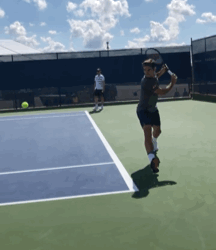

Left : Mr. Roger Federer
Right: Mike Faist as Art Donaldson
An one handed backhand is one of the harder techniques. It requires more power as you use just one arm, more training and is also considered as more dynamic.
Roger Federer is THE man of the one handed backhand, popular for the slice of his ball and called the “perfect tennis player” due to his elegance on court.
Art Donaldson, coached by non other than Tashi, who works with discipline and perfection as seen in the beginning, also uses one hand to strike. Tashi tries her best everyday to form the perfect tennis pro out of Art.
(She did great. In his early match against Patrick, he also used one hand to stabilize not able to use the extra reach and elegance of this technique)
So what’s the deal?
Shows his discipline through the years of training
the elegance (Roger Federer reference) only a true pro has
Trying to compensate his arm reach & agility (even though his food work is bomb)
🎾 Thanks for reading 🎾
10 notes
·
View notes
Text
— On Phainon's debating skills and the brilliance of the Citizens' Assembly scene in showcasing his character development.
In response to @stickyspeckledlight ’s questions. I've been a regular academic debater for about six years now so, I can't put into words how special Phainon being a debater (and such a good one at that, which we'll get to shortly) is to me. So thank you for giving me the chance to properly yap about this. My original reblog got too long so I had to make a separate post orz. Explanation includes spoilers for HSR 3.0, 3.1, 3.2 and 3.3 Trailblaze quests.

To be honest, listening to that debate for the first time was incredibly nerve wracking for me. It was, as you say, a gamble and it could've gone horribly wrong anywhere.
Something crucial to realize about debates is that, they're less of this rigid exchange of counterarguments and more of a performance. Sure, the validity of your logic matters but, you're also graded on auxiliary things like body language, eye contact, enunciation, idiolect, fluency, manners and how well you can keep your audience hooked.
It is often said that how you make your point matters more than the point itself — because, even the judges won't be listening keenly to what facts and data you're presenting sometimes.
When you accept that debates are like performances, it becomes easier to follow and bend the rules. As well as to have fun. This is something that Anaxa — our Great Performer — understands very well. I bring Anaxa up because I'm pretty sure it was him who taught Phainon this tactic, as mentioned by Phainon in the 3.3 quest, “In the end I remembered a lesson from one of my teachers: In battles where words are weapons, outrage and blind passion often overpower reason.”
Anaxa also says something similar before casting his vote, “You've done well, Phainon. Given the circumstances, delivering a rousing speech to stir up emotions was a prudent move.”
This isn't all made up for the sake of creating drama by the way. I've seen this tactic being used in parliamentary debates, at least in my country. The goal is to stir emotions among your audience (including the judges/jury) in the hopes of securing support, doesn't matter if it's sympathy, rage or something else. This should be in harmony with your logic.
It's... fascinating to watch when executed smoothly. Personally though, this tactic peeves me because, often it's used to divert attention from the fact that your argument isn't strong. It can also feel like an insult to the motion. And straight up calling your opponent irrational/overly emotional in response is classless and can even have your score deducted (which is why I mentioned manners as a criteria). So, you really need to be careful with how you respond to that.
Which brings us to the matter of Phainon calling the Council of Elders “vermin”.
I will not lie, it was incredibly satisfying. But that satisfaction of mine lasted for one glorious second before I became worried. It was the biggest gamble of the entire ordeal. As we later learn in Aglaea's letter to Phainon in 3.3 that a similar call-out gravelly weakened people's faith in Aglaea during the first debate.
The difference is that Aglaea, quite understandably weary from their schemes after all these years, did so in the heat of the moment. While Phainon purposefully used that word and then proceeded to lay out exactly why those people are deserving of being called vermin.
There is a hope placed behind this approach ; even if it upsets a large group of people, it'll leave an impression. And from that impression, people will subconsciously start to think. They'll compare Phainon's argument with their own experiences and from there on, the chances of them voting for the Flame Chase will increase slightly.
The greatest challenge of that arena was the fact that Phainon had to deal with a huge crowd. Making sure they're listening to you is one thing (which he did splendidly by the way) but, getting them to think, in the heat of the collective influence? That is infinitely more difficult. Which is why I concur with Anaxa, using this tactic for this situation, was indeed a prudent move.
There is another important development in Phainon's character that blossoms through this debate. The quality of Phainon that Aglaea has always complimented him on is his ability to sincerely connect with everyone in a way that she can't. However, this was also the quality that he'd struggled to wield.
See, Phainon doesn't really trust himself. And his lack of trust in himself unknowingly contributes to his doubt in others. Why? Because when you can't trust yourself, you'll constantly second guess your choices and your potential. You won't be able to believe it even if the people you look up to compliment you. As such, you won't be sure about your decision to lend your trust to someone.
Which is why, there is so much emphasis on Phainon vocalizing ‘unshakable faith’, and resolutely trusting his comrades and the people of Amphoreus in 3.3 instead of him gaining new powers or something.
That quality is what makes him worthy of World-bearing, separates him from other heroes and brings him closer to the image of Deliverer envisioned by everyone. We see glimpses of him starting to understand this during the debate.
First of all, the beginning. “As you (citizens of Okhema) look upon me, so too do I see you.”
This is an excellent opening. The words used are simple, echo easily and do not clash with each other. They include the audience, acknowledge their attention and establish a primary connection between the speaker and the audience all in one sentence.
Then, he stops people from thinking about the fate of the world and implores them to really think about the gravity of their situation. But he doesn't just explain why the Black Tide is dangerous, no no. He talks about his own, personal experience with the Black Tide, baring his heart, for the very first time in front of so many people.
The strongest connections are forged in shared vulnerability. Even if people can't empathize or offer sympathy for him, they'll still be reminded of their own experiences, or perhaps the experience of someone they know. Strengthening the primary connection.
When a citizen objects to this by asking why Okhema still remains peaceful, it's as if Phainon had been expecting that question. He uses it to not only defend Aglaea but to also present the corruption within Okhema and to drop that bomb.
It should be mentioned that Phainon does not include mind blowing new information in his speech, he only reiterates the truth that most citizens had forgotten in a concise manner.
And he closes his speech with great humility. It's obvious that Phainon really thought it through and had a mental roadmap of his speech (since we can clearly divide it into sections) but, I don't know why, perhaps it's the voice acting on this section, I felt like the ending was improvised by him.
As in, you get this feeling that he finally understood what exactly his role was within the debate and changed his closing to that of a promise at the nick of time. Not to mention the roundabout way Phainon asks Anaxa this question before he steps onto the stage, “Is Aglaea making the right decision by entrusting the fate of the world to me?”
To which Anaxa answers, “Flip your perspective and ask yourself this instead: What should I do to ensure that the world doesn't stray from the correct path?”
And Phainon does figure out what he should do, which isn't wrestling with words to gain votes by the way. It's having the backbone to trust the people he'll lead. And I think you can feel this shift in thinking within the speech itself.
The tonal shifts throughout the speech is perfect as well. He starts slow, lets people adjust to his voice and until that citizen poses that question, maintains an empathetic tone. He goes from reminiscent to distraught when mentioning his past but does not break into tears. The frustration and the disdain when he talks about the Council of Elders isn't out of control, even if it may seem like he was momentarily swept up in those emotions. As he was able to circle back to the tone he used in the beginning to close his argument.
But of course, this doesn't work like magic against all of those people, as the number of votes received by both sides were equal until Anaxa broke the impasse — which I think is very realistic. Had Phainon not taken the risk, the Flame Chase would've most likely seen a shameful defeat.
This whole performance was incredibly difficult to execute for Phainon, not only due to the dire circumstances but also because I suspect that this isn't his usual style. We have some crumbs about how Phainon performs in academic debates from memory fragments.

As you can see, he's very quick to catch loopholes and traps, he's also not reckless and does not hesitate to play it safe if he has to.
But in the debate against the Council of Elders, he had to be reckless and he couldn't play it safe. He was out of his comfort zone in more ways than one and yet, he managed to perform excellently. This showcases the versatility of Phainon's character that was only mentioned by a select few thus far.
In conclusion, Phainon is an excellent debater, orator and public speaker precisely because of this flexibility of his.

Honestly, we must applaud the writing team, translation team and the voice of Phainon (I've only listened to the English voice-over so I'm unsure if all these subtleties are still observable in other languages) for bringing this scene to life. Especially with such limited movement and facial expressions. Even I didn't know there was so much to talk about until I began writing this.
#all of that just to make phainon a fictional character smh#but yes this was the scene i was most hyped for when the 3.2 trailer dropped and still my favorite out of everything in 3.2#definitely in my top three Amphoreus moments#now if you'll excuse me i'll proceed to daydream about what phainon would think of my... evaluation#i don't know maybe he'd challenge me to a debate on the points i presented just for the sake of it or something#which i'd gladly take on btw#but for now.. a girl can dream 😔💔#phainon#phainon hsr#hsr phainon#hsr#honkai star rail#honkai star rail phainon#phainon honkai star rail#character analysis#harmony simps
145 notes
·
View notes